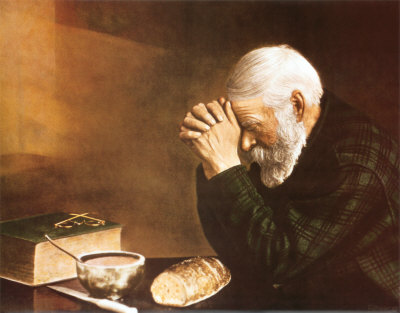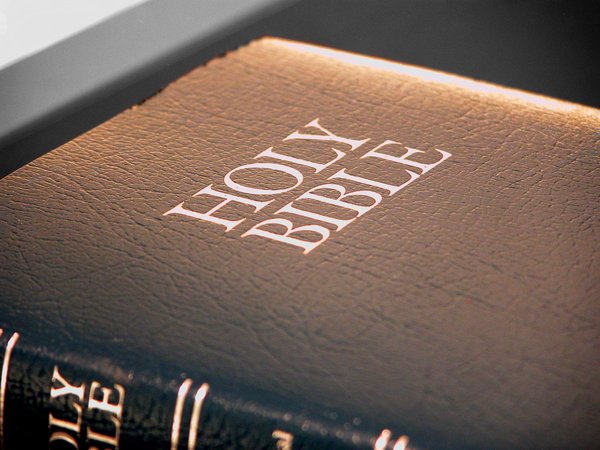Jesus, Thank You For Fantastical Stories
 Once upon a time, I drifted away from the habit of saying prayers before meals.
Once upon a time, I drifted away from the habit of saying prayers before meals.
My reasons were ridiculous. I was going through the kind of phase in which you assume that just because a practice isn’t in the Bible, there’s no point to it, and in which you believe a practice could be “legalistic” just because it’s a routine.
I’ve come back to praying before meals, though sometimes I still forget when I’m eating alone. My prayers are simple and haven’t changed much since childhood. That’s okay. No one said that if you can’t pray a “grown-up” prayer you might as well stop. In fact it’s the opposite attitude that’s legalistic and just plain immature. He said, “Pray without ceasing.”
Now I’m trying to expand the practice. I wondered: Why Do we only pray before meals and not also before or after receiving other good gifts that God gives us?
Scripture condemns demon-influenced false teachers who claim marriage and some foods are somehow unspiritual. On the way Scripture says God created food “to be received with thanksgiving by those who believe and know the truth” (1 Tim. 4:3). For such people this thanksgiving is not automatic. It’s a conscious action. God even states that “spiritual” practices, Scripture and prayer, are his people’s intentional means to enjoying other gifts:
For everything created by God is good, and nothing is to be rejected if it is received with thanksgiving, for it is made holy by the word of God and prayer.
— 1 Tim. 4:4–5
 I read this in light of SpecFaith’s gift-in-focus: fantastical stories.1 Here’s what I see.
I read this in light of SpecFaith’s gift-in-focus: fantastical stories.1 Here’s what I see.
- Everything created by God. No, God doesn’t directly create fantastic stories. Humans do, by seeing the world, taking parts, and arranging them in new ways. But God also does not directly create food. Humans do, by seeing the world, taking parts, and arranging them in new ways. This is why I tend to take what the Bible says about food, and the abuse of food, and apply the same principles to fantastical stories.
- Is good. This continues from God’s original creation. He does not create bad things.
- And nothing is to be rejected. So don’t be legalistic. In fact, that’s demonic doctrine.
- If. This is a huge if. It’s the catch, the condition. Otherwise perhaps we should reject the food, the fantastical story, or the thing — even a good thing that God has created.
- It is received with thanksgiving. Humans cannot skip straight to the gift-enjoyment. Instead we must receive good gifts with conscious and intentional gratitude to the Giver. Otherwise the above if would disqualify us from enjoying even the good gifts.
- For it is made holy. This is confusing, for if a food or fantastical story or any other gift is created good then why does it still need be made holy? John Piper preached a good sermon on this. I wonder if Paul has an implicit understanding that the gift must be made holy for us. It’s not the gift that has a persisting flaw. It’s ourselves.
- By the word of God and prayer. If you’re like me and you’ve long since grown tired of evangelicals’ overemphases of “spiritual” tasks like Bible reading and prayer, please don’t. Here’s the key: All that Bible reading and prayer is crucial for our chief end. And in some sense these tasks remain “over” other gifts we enjoy such as food and fantastical stories. Why? Because we need the word and prayer to make holy our use of the other gifts. Otherwise we can’t enjoy them. Otherwise we would be untrained, and our “joy” would be phony. We would be thankless thieves who rob the Giver.
So to enjoy a fantastical story, I should be seeing that story in light of God’s word. That’s the only way to make the story holy for me. And I should be seeing the story in light of prayer. I must consciously, intentionally decide to receive the story with thanksgiving. I’m sure there are many ways we can do that. But the first that comes to mind is a prayer before the story “meal” — a prayer very similar to the kinds of prayers people have prayed before eating.
What kind of thankful prayer would you say before or after receiving a story? Here’s mine.
Jesus, thank You for fantastical stories. Thank You for giving people the abilities to make these stories and show You, each other, and the world more of what You are like, more of what people should be like (or what they shouldn’t be like), and more of what Your world should be like (or shouldn’t be like). Thank You for human creativity, reflections of beauty, echoes of truth. Thank You for the ideas of magic and other worlds and amazing heroes.
Thank You so much for this particular story. It was amazing. You’ve gifted the storytellers with so many talents. May they trace their talents back to You and show You thanks. Thank You for the writer(s), artists, director(s), musicians, technical providers, everyone who helped make this story amazing. Thank You for that awesome line or that amazing moment.
Thank You that the good heroes won in the end. Thank You that the beauties make me weep for joy even when I’m not thinking about You as the source of all real beauty. Thank You that the story’s truths and challenges make me wrestle with ideas in my mind. Please help me continue to chase after You as the source of all beauties and truths. Please keep me from ever believing the notion that this “training” by the word and prayer is unnecessary. Help me to keep longing for perfect joy in You and reject any sin or abuse of Your gifts that gets between me and You. And help me to keep being thankful for fantastical stories. Amen.
- However, most or all of what I say here directly applies to all popular culture in general. ↩





























Amen! I thank Him the most for the hope He gives us in Jesus.
Here’s a little bit of trivia about thanking the Lord for our food: the Bible actually directs us to pray and thank God AFTER we eat. Deut. 8:10 (NIV) “When you have eaten and are satisfied, praise the Lord your God for the good land he has given you.”
We used to say the “God is great, God is good” grace when I was growing up and I taught my children that, as well. After I read this, I told my kids “God is good, God is great. Thank You for the food I ate.” They think I’m nuts. HA!
The simple act of giving thanks is so often lost in today’s culture. It’s good to be reminded that we shouldn’t take any of God’s gifts for granted, including our favorite fantasy stories.